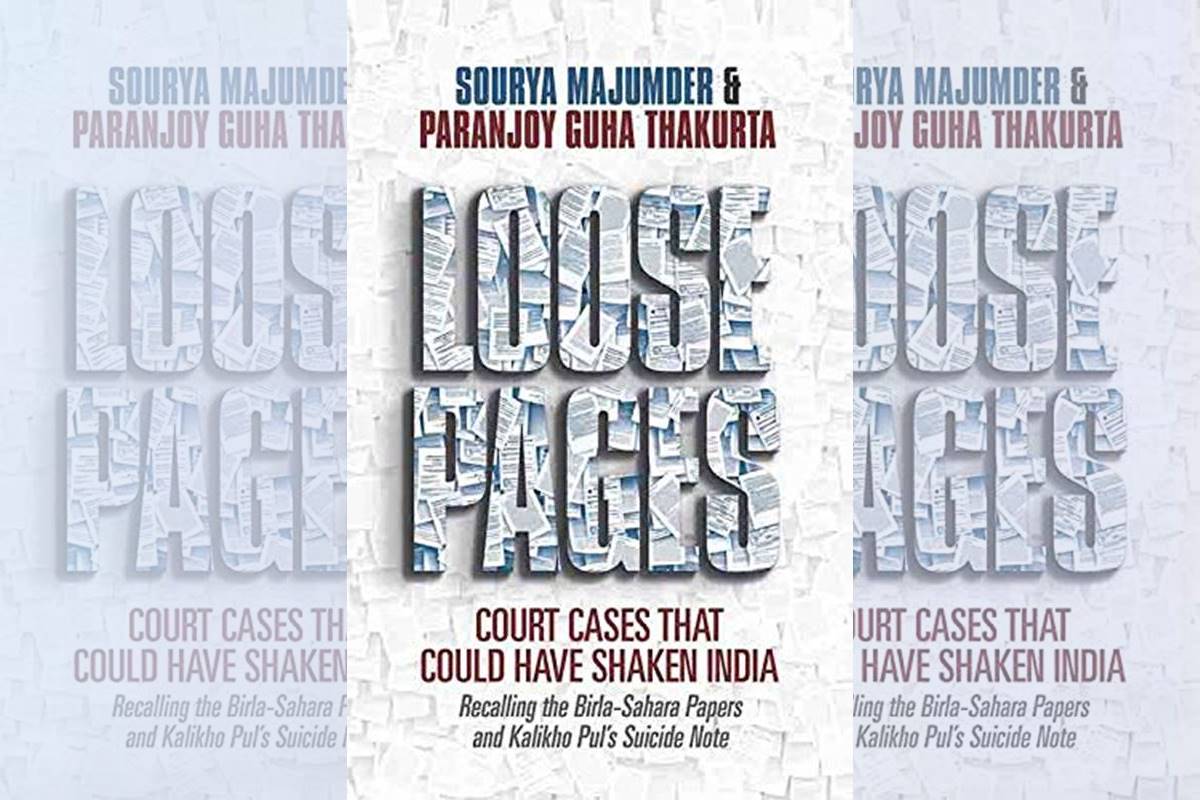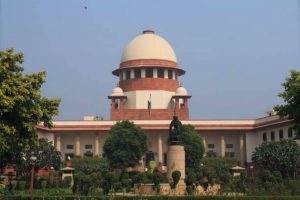Book: Loose Pages – Court Cases that Could Have Shaken India
Authors: Sourya Majumder & Paranjoy Guha Thakurta
Price: Rs 545
The term fast and loose assumes special significance for Indian democracy and its people, many innocents amongst them, who look upon the institutions of Indian democracy as sacred. Not so for the many high priests into whose world of impeccable dishonesty, Loose Pages: Court Cases That Could Have Shaken Indiaprovides a clear perspective.

It is no one’s case that the dramatis personae in this book are the sole custodians of moral turpitude. In today’s India there are far worse examples but in recalling the Birla-Sahara Papers and former Arunachal Pradesh chief minister Kalikho Pul’s suicide note, the authors have presented a trend, a distinct characteristic of governance in India on the basis of available evidence; some of it lying in the public domain for several years with no one, certainly not the law and order machinery nor the judiciary, treating them with the seriousness that they deserve. Indeed, the dismissive disregard shown to the evidence by the judiciary is what forms the foundation of the book.
This is a messy world of ambitious corporates in a hurry to grab resources; bureaucrats with the power to clear projects, overlook tax evasions, some judges choosing not to believe the believable and accept the not-so-credible; politicians on the take for humongous sums; lawyers turned politicians who sometimes denigrate a party as criminal from a political platform but defend them in courts of law; the labyrinthian world of the lobbyist slyly moving from corporate houses to income-tax offices to courts and even into the chief ministers’ inner circles, not to mention social clubs and celebrations where the high and mighty meet as one big community.
It is also the world with honest politicians, hard working lawyers fighting for justice and judges who do not cavil in breaking the code of conduct when they believe that the judiciary is at risk of being mangled from within. It is in this world that one meets the likes of Kosaraju Veeraiah Chowdary, who currently sits at the commanding heights for monitoring all wrongdoing, as the head of the Central Vigilance Commission.
One is first introduced to him in his junior avatar, handling the sensational papers seized by the income-tax department that raided the offices of the Sahara Group of companies in November 2014 to discover a treasury of malfeasance: cash worth Rs 137 crore, apart from papers, documents and a computer hard disk that produced a spreadsheet showing the trail of money disbursed in 2013-14, during the run-up to the elections.
Of a piece with the Sahara disclosures are records seized during raids of the Aditya Birla group by the Central Bureau of Investigations in October 2013. Once again there were coded names with sums mentioned against them. Both the Sahara and the Birla had many other sensational entries as well but, amongst the many exciting trails that the Sahara papers had, one led to the offices of the Gujarat chief minister, the Prime Ministerial candidate of the Bharatiya Janata Party (BJP). One cryptic entry showed a Rs 25-crore payment to him!
Under normal circumstances, a CBI reference for criminal investigation would have been in order in the Sahara case but KV Chowdary, heading the investigating team, chose not to do so. That he would see a meteoric rise following the historic win of the BJP occasioned little surprise and in a few quick moves he became adviser to the Supreme Court-appointed Special Investigative Team on black money and thereafter the Chief Vigilance Commissioner, in a break from convention of having an IAS for the position and after having overcome major obstacles like a petition in the Supreme Court of India challenging his appointment on account of the unhappy state of probity around the matter that he handled and only after benches were created at the apex courts to address his appointment.
Loose Pages follows the tentacles of turpitude as they wove themselves around every pillar of democracy. If the bureaucratic end of the spectrum was supervised by Chowdary, at the other end were the honourable Justices JS Khehar and Arun Mishra, the latter known for his proximity to the party in power and the former finding his name mentioned in circumstances that do no glory to the judiciary, which did not, however, come in the way of his going on to be appointed the Chief Justice of India.
Not only was he the judge who had heard both the Birla and the Sahara cases but also one who found a not-so-honourable mention in the suicide note of the Arunachal Pradesh chief minister, Kalikho Pul, whose widow took the matter to the Supreme Court, where she had to obtain clearance for a case being registered against Justice Khehar, who had by then become Chief Justice. The CJI found himself in an uncomfortable position of having to permit an FIR against him and propriety demanded that he pass on the matter to the brother judge next in order of seniority and having nothing to do with the case.
He chose not to and asked a far junior judge No. 14, Justice Adarsh Kumar Goyal, once his subordinate in the High Court of Punjab and Haryana, to deal with the matter. The letter was converted by Chief Justice Khehar into a writ petition on February 22 and placed before a twomember bench constituted by him. Justice Goel, who presided over the bench was the 13th in seniority while his brother judge, Justice Uday Umesh Lalit was the 17th. The authors asked the former CJI in writing for the rationale behind this move but got no response. The complainants later realising that the chips were totally against them, withdrew the complaint.
The Pul suicide note is important for more reasons than one. It is a detailed note by a chief minister accusing judges of the Supreme Court asking for Rs 86 crore as bribes to decide a case challenging his government’s right to be in power. Of this, Rs 9 crore was to be paid in advance and Rs 77 crore later, with Rs 46 crore earmarked to be given to Justice Khehar’s son, Birinder Singh Khehar. The funds were not forthcoming and Pul’s government was brought down, but there was a follow-up request for Rs 31 crore for the verdict to be upturned with an assurance that Justice Khehar would guide him about the timing and content of the petition.
Pul’s suicide note had meticulous details of corruption under the Nabam-Tukil-ed Congress government in the state, which he had presented to several Congress leaders (Pul having been a Congressman earlier), including Kamal Nath, the current chief minister of Madhya Pradesh and chief minister of Puducherry Velu Narayanasamy, who headed the state wing of the party in Arunachal Pradesh. Not only did the judiciary ignore the details, the Prime Minister did not grant Pul’s widow an audience, the state government did not call for an investigation, the local hue and cry died down with the case receiving an anti-climactic burial, leaving questions about the crumbling defence that the Constitution of India provides against corruption through the three branches of governance — the legislature, the executive and the judiciary — with the heads of every pillar of democracy implicated by the evidence that was eventually dismissed with the concurrence of the Chief Justice of India.
Such are the fascinating manoeuvres turning the wheels of justice traced by the book, from the days of the Jain-Hawala case, in which the diaries seized documented slush funds being handed over to leaders of both the Congress and the BJP, which were dismissed because of the nature of the binding or the absence of it and not because of the rather credible evidence that they contained that clearly called a probe, if nothing else.
Things have, of course, become worse over the years, as the promotion of the current CVC, in the face of strident public criticism of his past record, would testify. Once again Justice Khehar was to the fore with his name coming up in a petition filed by Common Cause challenging the appointments of both Chowdary as the chief and his second in command, the vigilance commissioner.
Advocates for the petitioners urged Justice Khehar to remove himself from the bench hearing the petition lest his presence lead to imputations since he was next in line for appointment as Chief Justice of India.
The matter was pregnant with political and ethical import because this was about alleged political corruption that would potentially implicate the incumbent Prime Minister apart from a host of leaders from both the BJP and the Congress. Justice Khehar went on to receive confirmation as CJI, recused himself and handed over the matter to Justice Arun Mishra, 12th in seniority and Justice Amitava Roy, 19th in seniority, having taken away the presiding assignment from two senior judges, Justice Ramana and Justice Agrawal. Curiously, he handed the assignment back to them after the Chowdary hearing was amenably assigned. Just as the Birla-Sahara papers were found to have zero evidentiary value because the documents were not in a bound book.
Thus the seized documents were returned to the Birlas, many other inconvenient evasions were managed under the general tax amnesty schemes, the Income Tax Settlement Commission moved in with its powers to grant immunity to assessees and everything was settled with remarkable speed because, in their collective wisdom, the dispensers of justice had decided that the details of the payout were no more than “dumb documents” created by a disgruntled employee. Several honest officers had been shunted out of the investigations for their crime of having done their work with integrity. What was sacrosanct was Subrata Roy’s assertion that “neither M/s Sahara India nor any other entity of the Sahara Group indulges in unaccounted cash transactions”.
One may well argue that the cash was not unaccounted, only off the formal books of accounts, which is the way that much of Indian business is managed. No one in India can possibly argue with the existence of ‘ek number and do number accounts’ (accounts no. 1 and no. 2), the latter referring to the black money that the system generates to keep the wheels of permissions and clearances moving; something that the “Chowkidar Prime Minister” is committed to ridding the system off. Yet, here were cases that could have laid bare the murky meanderings of slush money finding its ways into election funding, right up to a reigning Prime Minister, into the process of government formation, into obtaining clearances for environment-devastating projects that are spelling ultimate ruin for India’s tribal population, all of which were buried by the full might of the state.
Indeed, so strong are the pressures of competitive corruption that heads of institutions are turning against each other — earlier they used each other to clear their names — as was publicly reported during the fratricidal war within the CBI, while decent judges, unable to countenance the rotten goings-on within the corridors of judicial power, address press conferences to inform the public about the state of affairs. Eventually of course, everyone celebrates the success of the art of how not to bring the guilty to book.
(The reviewer is a freelance contributor)











